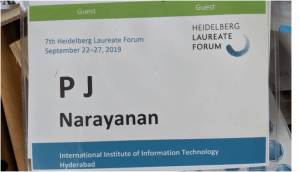Every year, the Heidelberg Laureate Forum (HLF) brings together top visionaries of Mathematics and Computer Science and winners of the Abel Prize, Fields Medal, Nevanlinna Prize, Turing Award and ACM Computing Prize for a week-long discussion with young researchers on the advancements and future of Mathematics and Computer Science. Here are Prof P J Narayanan’s takeaways from HLF 2019.
The Heidelberg Laureate Forum was started in 2013, bringing together along with the laureates, over 200 young researchers, who could be PhD students, recent PhDs, and even a few UG students. HLF, I believe, is inspired by the Lindau Forum that brings together all Nobel Laureates to Lindau. Neither a laureate nor a young researcher, I got to attend courtesy of being a de facto reviewer/organizer of HLF for many years.
The young researchers come from all over the world, including Africa, South America, South and Southeast Asia, etc., along with the developed countries. It is truly satisfying to be among a bunch of motivated, global researchers! I saw 10 to 15 participants from India in the events I attended, with many more Indians from outside India. All eligible Laureates are invited (along with the spouse) each year; about 25 to 30 come each year to the Forum. In all, the talks are illuminating with plenty of opportunity to interact with everyone. It is held at the New Auditorium of the Heidelberg University.
The week-long event consists of talks, a small number of workshops, Hot Topic sessions, many parties including a farewell dinner in the Heidelberg Castle on the last evening. There’s also a mid-week afternoon boating trip on the Necker River!
The Forum is funded by Klaus Tschira Foundation and strongly supported by International Mathematical Union, Norwegian Academy of Science and Letters, and Association for Computing Machinery (ACM). I was an active volunteer of ACM (including the ACM India Council Chair/President) from 2009 onwards. I was also in the panel of 100 or more jury members who evaluated the applications from potential young researchers from 2013 through 2018. HLF2014 had organized a Hot Topic session on Mathematics & Computer in the Developing Countries in 2014, to which I was invited as a presenter and a panelist. It was great to listen to people from Bangladesh, Ecuador, Cambodia, Niger, etc., at that session.
Klaus Tschira is a founder of SAP. He was an active participant at the HLF events in 2013 and 2014. Unfortunately, he passed away in March 2015, but his spirit is strongly felt in the subsequent events. What a legacy he has created!
Deep Learning for AI
Prof Yoshua Bengio of University of Montreal and MILA gave his Turing Lecture as the opening lecture. With Deep Learning transforming AI and the technology world drastically, it was indeed a privilege to listen to one of its pioneers. Yoshua touched upon different aspects relating to Deep Learning. Some of my own takeaways are given below; do not discount my inability to understand the right points! Do watch the lecture yourself:
https://www.youtube.com/watch?v=llGG62fNN64
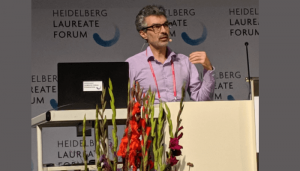
- Deep Learning provides hierarchical representations and abstractions, using compositionality to fight the curse of dimensionality.
- Higher-level of abstractions disentangle the factors of variation, which allows easier generalizations.
- In a very high dimensional space, local minima are likely to be close to the bottom. If you can’t escape using any of the dimensions, it must be quite good!
- Cognitive tasks can be of two types: System 1 tasks involve the intuitive tasks that we do with our cortex and System 2 tasks are logical, sequential ones that the hippocampus and the prefrontal cortex perform well. DL is good at System 1 tasks and classical AI focussed on System 2 tasks. We need to combine both to address any serious problem. Work is proceeding in that direction now.
- We are still far from human level AI, with poor generalization beyond the training distributions, several adversarial weaknesses, etc. Learning causal dependencies and disentangled representations are the key to making progress in the future.
- He ended with an appeal to use AI for social good. AI can be misused much and we should favour applications that benefit the poor countries, climate change, healthcare, etc. It was heartening to see such concern from a top scientist.
Brilliant Minds, Wonderful Humans
I got to catch up with John Hopcroft and Martin Hellman at the event. Wonderful humans, besides being brilliant Computer Scientists!
John has been working with the Chinese academic system, starting at the highest level! His insights are quite against the grain today: He started working on the education system by improving the teaching. He is critical (from what I can understand) of research as the only thing and the modern academic ranking. He is working on a teaching-based evaluation of universities, at least in China. Hope some of his ideas become mainstream!
Automation vs Autonomy
Turing Award winner Joseph Sifakis presented a lecture on “Can We Trust Autonomous Systems?”, giving a framework to tackle this question at HLF2019.
Main distinction was between automation (which we understand in systems) and autonomy (which we don’t). The claims of autonomous driving companies that “our system has run N million miles without incident and hence is safe” can’t be sufficient as the designs are most often devoid of system engineering principles.
His framework had two axes: System Trustworthiness and Task Criticality, with the diagonal forming the “automation frontier” with trusted humans on one side and trusted systems on the other. See the picture for some of the tasks he placed on the frontier!
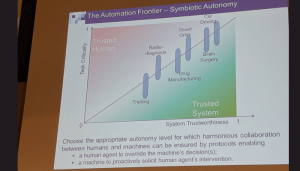
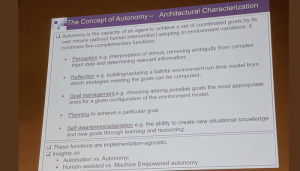
Trusted systems are often based on sound models and mathematical analysis. The ML-based AI systems that are in the news are often not verifiable. However, both will have their place in any real system. We need to understand hybrid systems that combine both, in a trusted way appropriate for the task.
I don’t claim to understand much about these issues, but the talk was timely, indeed!
Technology and Ethical Evolution
Martin Hellman is a Turing Award winner who invented what is known as the Diffie-Hellman Key exchange scheme. He is a lot lot more than a brilliant computer scientist. He works on security at its broadest scope today, including nuclear security, policies for peace among nations, etc.
He wrote a book with his wife Dorothie “A New Map for Relationships: Creating True Love at Home & Peace on the Planet”, which is as important to peace within a home to peace in the world, as per critics. The book is available free in PDF form from his site.
ACM India had him as a speaker in the 2018 Annual Event at Nagpur. I persuaded Marty to visit IIIT Hyderabad on the way to Nagpur, where he gave a talk that touched on computer science and human peace in equal measure. He talked about how he made enemies of the NSA for his analysis on the inadequate security of the proposed DES scheme. And how he made peace with the NSA chief later and of the lessons he learned. And how all those lessons really started with his relationship with his wife at home!
Hellman is still active in international efforts towards nuclear peace and was involved in the 80s with starting meaningful dialogue between American and Soviet scientific communities! These are indeed science people who keep the larger issues firmly in mind always.
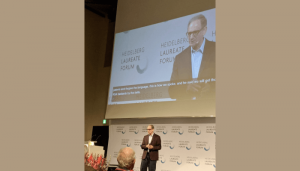
His talk at HLf19 was titled “The Technological Imperative for Ethical Evolution”, starting with a discussion on the Manhattan project. Nuclear annihilation was a reality after that; there are many ethical issues emanating from technology today including climate change, rogue AI, etc. His personal and enlightening description of the dilemma when told his findings will affect national security “gravely”. He had the option of obeying the instruction on national security or expose the inadequacy of the scheme by publishing it, which would also, in all probability, make him very famous! He talked about the need to make the right decision for the right reasons. He also recounted the meeting later with the then chief of NSA who turned into a great friend later. Marty’s message: Friends are better than enemies!!
His message was also that ethics are an evolutionary process. Technological progress requires fast ethical evolution. And that there is great hope that humanity is becoming more ethical. He ended with an easy exhortation to pursue the noble hypothesis that human beings are capable of resolving our differences and creating a world of peace. Born on October 2nd, Marty does live up to the spirit of Gandhiji!
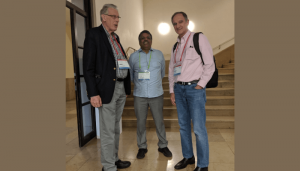
I highly encourage everyone to watch various videos of his talks. The recent ones are in #HLF19 as well as at the Lindau Nobel Laureates Forum. Please see his web page to get a glimpse of his breadth. https://ee.stanford.edu/~hellman/
Mobile phones in Healthcare
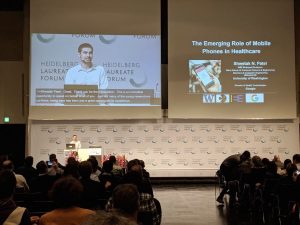
Shwetak Patel, the latest winner of the ACM Computing Prize, spoke about the role of Mobile phones in Healthcare. Amazing energy and an amazing range of work, indeed. Several efforts were presented:
- Lung Function test by blowing into the microphone. All the noise being cancelled for speech processing is what you need to measure the noise made when blowing. This was developed even for a simple feature phone!
- Using sound to distinguish between TB cough, pneumonia cough, etc!
- BiliCam: To detect infant jaundice from a flash camera image. Bilirubin measurement also works for adults and can have a possible role in early identification of pancreatic cancer. Can sense much earlier (Steve Jobs!)
- Haemoglobin measurement from the phone and its flash.
And several more, each with high correlation with the readings from standard medical devices! Many of these are being used or tested in Peru, South Africa, India, etc., and are making a real difference!
Steve Jobs died of pancreatic cancer and here, a device he invented/popularized is now being used to help those with that dreadful disease! Steve will indeed be proud!
As an aside, the speech was automatically transcribed to text for every speaker. Shwetak speaks so fast, one felt sorry for the ASR system, though it held up quite well!
Grand Challenges of AI
Raj Reddy spoke about the Grand Challenges of AI: The Unfinished Agenda. He is a visionary and an extreme optimist with great passion to employ the computing and communication technology for the benefit of those who need it badly. It has been my privilege to work closely with him for about 20 years now. It is said that the then AP Government agreed to establish IIIT Hyderabad only when they got a firm commitment from Prof Reddy that he will be involved significantly. He has held his end of the promise solidly for over 20 years now and we continue to benefit from having him as the Chair of IIITH’s Governing Council.
Raj Reddy pushes us to do more and more, especially in the social space. He has been pushing speech-to-speech translation technology as a solution to connect every Indian with the fruits of the information revolution. His wish for an illiterate woman from a village in Andhra Pradesh to be able to watch and hear National Geographic in her native Telugu, translated live! He has been guiding a team in IIIT Hyderabad on large-scale speech data collection in multiple Indian languages using a mobile phone. He has also been passionately pushing to create 3 million pages in Telugu Wikipedia. A project is being envisaged, with a pilot involving school children that’s being implemented at the Kohli Centre on Intelligent Systems at IIIT Hyderabad.
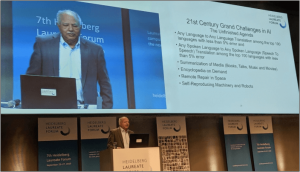
He has achieved much, naturally. But talks constantly about what more can be done, or the Unfinished Agenda! His talk started with exhorting the young researchers to complete some of the grand challenges he presents. Grand challenges are goal-oriented (as opposed to curiosity-driven) research. The Longitude Prize (in 1714) and Ortieg Prize are the early ones, right down to the XPrizes that are currently on. DARPA grand challenges played a big role in creating autonomous driving in different conditions.
In 1988, Raj Reddy made a list of Grand Challenges for AI, of which 3 or 4 have been solved now.
- World Champion Chess machine, got solved in 1996, primarily due to computers getting faster. However other games like Go and those with more hidden information like Mahjong are getting solved also.
- Accident Avoiding Car, got “solved” in 2005, primarily due to DARPA driving challenges.
- Understanding science text and taking exams. This is a hard problem. The Allen Institute for AI has announced a solution of some kind in 2019 for this.
He then listed his 21st Century grand challenges for AI
- Any language to Any language translation, at least for the top 100 languages, with < 5% error.
- The same, but for speech-to-speech! This is a big enabling technology for illiterates or functional illiterates of the world.
- Summarization of Media including books, talks, music, movies, etc.
- Encyclopedia on demand that keeps updating itself.
- Remote Repair in Space, if we need to start inhabiting Space!
- Self-Producing Machinery and Robots, again for in Space.
- Cognition Amplifiers so that we can do more work in less time using an always on, working, learning.
- Guardian Angels, that is, agents that do things that you cannot do!
He also suggested using the 17 sustainable development goals (SDGs) as the basis of finding grand challenge problems for the future. Hope some of these will be solved in the coming years! The video is available at https://www.youtube.com/user/LaureateForum/videos
Informal Interactions with laureates
The Heidelberg Laureate Forum creates plenty of socialising opportunities. The third day involves no lectures/talks, but a forenoon visit to institutions for the young researchers. The afternoon is a delightful boat trip on Neckar River that lasts over 3 hours (including 2 locks) with lots of food, drinks, and opportunity to socialise. The laureates are ever eager to interact with, give advice to, and/or entertain and enlighten those around them. The opportunity to mingle and communicate with the top minds is unforgettable indeed.
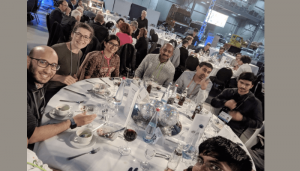
I sat at a table for a while with Vint Cerf and Shwetak Patel who were giving lots of valuable information and advice to a bunch of young researchers. Shwetak is the most-recent recipient of the ACM Computing Prize (formerly the ACM Infosys prize) from University of Washington. He works with about a dozen PhD students at a time, half a dozen undergraduate students, and a dozen high school students! His high school student interns have gone on to publish first-author papers including an award winning one in CHI in 2010 or so. Wow!
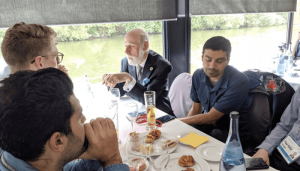
Vint Cerf is among the most obliging Turing Award winners, ever ready to interact with youngsters. His modesty is truly humbling. He visited IIIT Hyderabad in 2013 and was impressed by our institutional structure of organising around research areas/centres, not departments. So impressed, he talked about it to several individuals. We asked him to be a member of IIIT’s Governing Council as an Eminent Scholar in 2014 and he agreed! Though he hasn’t yet come to a GC meeting in person, he has attended several over phone from a different time zone and takes interest in the institute affairs.
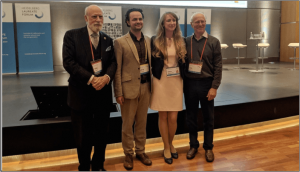
Jeff Dean is ever popular with the young researchers. See him being mobbed like a rockstar. The crowd includes Leslie Lamport in a red T-shirt with a backpack!
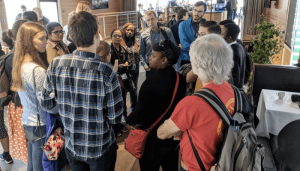
A call for culture and diversity
Caucher Birkar is among the latest Fields Medal winners, currently at Cambridge University. His story is truly inspiring. As a Kurd who grew up in a conflict zone on the border of Iran, Iraq, and Turkey, he was a refugee in Britain after his college, living a life of hardship for sure. That he made such seminal contributions to Algebraic Geometry (which he explained at HLF2018) is indeed an assertion of the human spirit itself! He shared his personal story in a talk on the last day at #HLF19, closing with a fervent appeal for diversity in the field and an endorsement of culture as the most important aspect of life! He is also a humble, down-to-earth guy from what I could observe when having lunch with him and a bunch of young researchers!
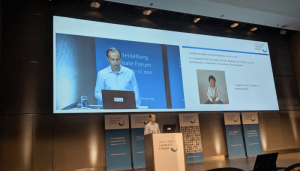
I am able to feature only a few of the talks in detail. There was much going on in terms of other talks, a Hot Topic session on Climate Change, several workshops, panel discussion on Gender Gap in related areas, etc. However, the biggest event is the ability to interact with the laureates, other guests, as well as among the young researchers themselves. Turing Award winners Vint Cerf and John Hopcroft have attended all of the HLFs so far, I understand, because they truly value the opportunity to interact with and influence the next generation of researchers. Michael Atiyah, the Abel Prize winner, also attended all HLFs till he passed away early in 2019. I am sure there are several others. They take great interest in talking to everyone. I saw from up close the dinner tables with Stephen Cook, Shwetak Patel, Raj Reddy, Martin Herman, Vint Cerf, Caucher Birkar, Bob Tarjan, and others, speaking with dozens of youngsters. Many did it inspite of their advancing ages!
Another successful and impactful HLF came to an end with a grand dinner in the Heidelberg Castle. Special thanks are due to those who make it happen on the ground from the Tschira Foundation, such as, Andreas Reuter, Ruth Wetzlar, and others I don’t know!
Coming together of Indian minds
HLF19 is the third one I attended (after 2014 & 2017). Klaus Tschira has left a wonderful legacy through the Heidelberg Laureate Forum. Generations of young Mathematicians and Computer Scientists will benefit from interacting closely with the stalwarts of the fields over a week at the HLF. The lessons they learn make them better researchers and individuals. Hats off to those who make it happen: Beate Spiegel, Andreas Reuter, Ruth Wetzlar, and several others!
I wish we can create such a forum for larger number of Indian researchers and students to interact with global visionaries. We need a Hyderabad/Mysore/Jaipur/…. Laureate Forum that brings top laureates to India, along with 200 young researchers (YRs). Since the opportunities in India are fewer, 100 of the YRs can be from India, with the rest coming from all over the world. It is important for the YRs to be from diverse geographies and backgrounds so that the Indian YRs see that side of the technical world also. I understand there is an annual Nobel Forum of sorts that brings a number of Nobel Laureates to India for interactions that the DST/GoI funds. That is a wonderful effort and should continue and grow.
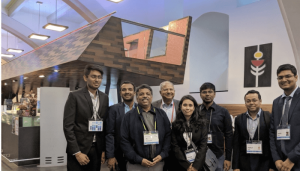
Given the great interest in computing areas, it is only appropriate to have a forum that focusses on those areas. It is best done by a private foundation, supported by one or more companies or an individual who has benefitted greatly from the growth of IT in the country, as a way to give back to the youngsters an opportunity to excel in the future.
Signing off with such a grand wish!
